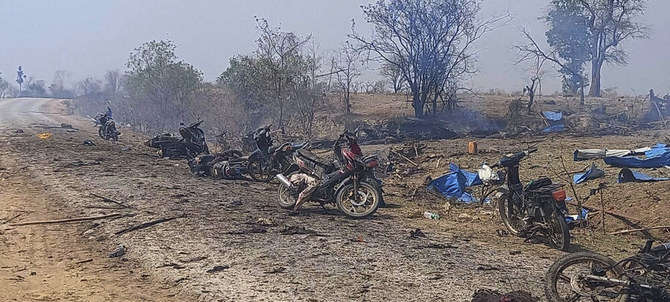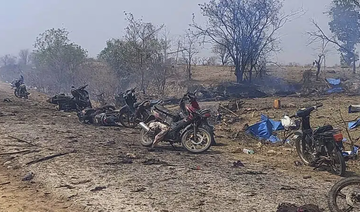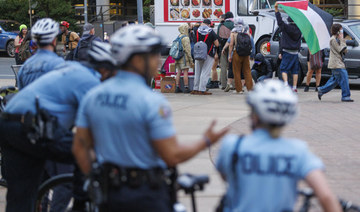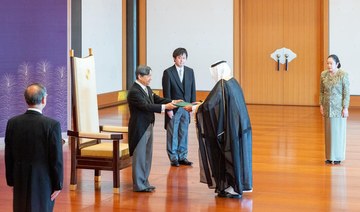JAKARTA: The Association of Southeast Asian Nations said it “strongly condemns” an airstrike carried out by the Myanmar military, which killed over 100 people including children, as calls mount for the regional bloc to play a bigger role to resolve the crisis.
The Myanmar Air Force dropped multiple bombs on Pa Zi Gyi village in the central Sagaing region on Tuesday, as military helicopters fired on a gathering attended by mostly civilians. Infants and the elderly were among those killed in the strike.
ASEAN, of which Myanmar is a member, joined the global condemnation on Thursday of the deadliest junta attack since the country’s military coup two years ago.
“ASEAN strongly condemns the reported recent air strikes carried out by the Myanmar Armed Forces in Pa Zi Gyi Village, Kanbalu Township, Sagaing Region of Myanmar, that claimed the lives of at least dozens of civilians,” ASEAN chair Indonesia said in a statement.
It also reiterated ASEAN’s commitment to continue assisting Myanmar in resolving the crisis “through promoting the full implementation of the Five-Point Consensus,” referring to a peace plan agreed to in 2021 to end the violence triggered by the military coup.
“All forms of violence must end immediately, particularly the use of force against civilians,” the statement said.
At least 165 people, including 27 women and 19 children, were killed in the airstrike, the human rights minister of the ousted shadow National Unity Government, Aung Myo Min, wrote on Twitter on Thursday.
Tuesday’s attack came barely a week after Indonesia said diplomatic progress was being made in Myanmar, following continued efforts by the military to crush resistance, including through airstrikes and ground attacks.
Those moves have displaced thousands and killed multiple civilians, including children, with schools, clinics, and hospitals also destroyed.
This week’s airstrike has also put a spotlight on ASEAN’s role in the crisis, as Southeast Asian leaders are set to attend the 2023 ASEAN Summit in Indonesia in May.
“ASEAN leaders must use their upcoming Summit in May 2023 to initiate complementary punitive action,” Myo Min said in another tweet, as he called on the bloc to ban junta representatives from attending all ASEAN meetings.
ASEAN’s role is “important, yet still constrained” when it comes to addressing the conflict in Myanmar, said Dr. Ahmad Rizky Mardhatillah Umar, an Indonesian international relations researcher at the University of Queensland, Australia.
Despite the five-point consensus, ASEAN also has a long-held principle of non-interference, he added.
“ASEAN’s responses to the recent air strike from Tatmadaw (the Myanmar military) shows this dilemma. To date, under Indonesia’s chairmanship, ASEAN has engaged in quiet diplomacy to reach a deal with all parties in the conflict,” Umar told Arab News.
“The next steps from ASEAN in the next ASEAN Summit is an important one to look at in order to achieve a durable solution in Myanmar.”
The Myanmar junta has “clearly ignored” the 2021 agreement with ASEAN, Amnesty International Indonesia said.
“ASEAN must immediately push for new, stronger efforts to put an end to the human rights crisis in Myanmar,” it said in a statement issued on Thursday.
Phil Robertson, deputy Asia director at Human Rights Watch, said ASEAN’s five-point consensus is “on its last legs because of SAC junta intransigency,” referring to the military government.
“Yet the EU, US, Australia and others continue to prop up this straw man because if they didn’t, they would have to come up with their own solution and so far, they are not prepared to do so,” Robertson told Arab News.
“The problem is that simply hoping things will get better, and that the Myanmar military will recognize they need to come to the negotiating table, has gotten ASEAN nowhere.”
Calls mount for ASEAN action as bloc ‘strongly condemns’ deadly Myanmar airstrike
https://arab.news/zdjw9
Calls mount for ASEAN action as bloc ‘strongly condemns’ deadly Myanmar airstrike

- At least 165 people, including 19 children, were killed in Tuesday’s attack
- Indonesia will host Southeast Asian leaders for ASEAN Summit in May
UK ambassador to Mexico sacked after pointing gun at employee, Financial Times reports

- Jon Benjamin is no longer listed as ambassador on his LinkedIn page
MEXICO CITY: The British ambassador to Mexico was fired after allegedly pointing a gun at a local embassy employee, an incident that was captured on video and circulated on social media, the Financial Times reported on Friday.
Ambassador Jon Benjamin was traveling through two Mexican states known for their heavy cartel presence when he picked up a gun and pointed it at an employee inside the vehicle they were traveling in, the outlet reported, citing the video and people familiar with the matter.
The episode occurred in April, the sources told the Financial Times, and Benjamin was fired soon after. Benjamin’s LinkedIn page says his term as ambassador ended in May, and a biography on the UK government website says he “was UK Ambassador to Mexico between 2021 and 2024.”
He did not immediately respond to a request for comment, nor did the embassy.
A video of what appears to be the incident in question was first published on X earlier this week from an anonymous, recently created account with the username @subdiplomatic.
It shows a man purported to be Benjamin sitting beside the driver in a stationary SUV-type vehicle and turning, smiling, to point it at a person in the back seat. The video has not been verified by Reuters.
Police arrest ‘many’ at Israel-Hamas war protest at UC Santa Cruz, school says

- Campus, local and state police swarmed the protesters, and video from local news stations showed officers telling people to leave
- There appeared to be some pushing and shoving between police and protesters
CALIFORNIA: Police in riot gear surrounded arm-in-arm protesters Friday at the University of California, Santa Cruz, to remove an encampment and barricades where pro-Palestinian demonstrations have blocked the main entrance to the campus this week.
Many people were arrested, the university said.
Campus, local and state police swarmed the protesters, and video from local news stations showed officers telling people to leave, then taking away signs and part of a barricade. There appeared to be some pushing and shoving between police and protesters. Officers carried zip ties and appeared to detain a few people.
“For weeks, encampment participants were given repeated, clear direction to remove the encampment and cease blocking access to numerous campus resources and to the campus itself,” Scott Hernandez-Jason, a spokesperson for the university, said in a statement Friday.
“They were notified that their actions were unlawful and unsafe. And this morning they were also given multiple warnings by law enforcement to leave the area and disperse to avoid arrest. Unfortunately, many refused to follow this directive and many individuals are being arrested,” Hernandez-Jason said.
The university did not have the exact number of arrests by Friday afternoon. Chancellor Cynthia Larive said in a letter to the community Friday that some demonstraters remained at the entrance.
She said that the road blockades, “with fortified and chained barricades made of pallets and other materials, and other unlawful actions, disrupted campus operations and threatened safety, including delaying access of emergency vehicles.”
It wasn’t known if anyone was injured. The university was holding classes remotely Friday.
Graduate student workers at UC Santa Cruz continued a strike that began last week over the university system’s treatment of pro-Palestinian protesters. The strike will expand to three more campuses next week, their union said Friday.
The strikes began May 20 at UC Santa Cruz, and then extended to UCLA and UC Davis. Members at UC Santa Barbara and UC San Diego will walk out on June 3 and at UC Irvine on June 5, UAW Local 4811 said. Union members include graduate teaching assistants, researchers and other academic employees.
Protest camps sprang up across the US and in Europe this spring as students demanded their universities stop doing business with Israel or companies that they say support its war in Gaza. Organizers seek to amplify calls to end Israel’s war with Hamas, which they describe as a genocide against the Palestinians.
The Associated Press has recorded at least 83 incidents since April 18 in which arrests were made at campus protests across the US More than 3,025 people have been arrested at 62 colleges and universities. The figures are based on AP reporting and statements from universities and law enforcement agencies.
The confrontation in California came a day after arrests at a pro-Palestinian encampment at a Detroit campus and a student walkout during commencement at the Massachusetts Institute of Technology.
On Thursday, police in riot gear removed fencing and broke down tents erected last week on green space near the undergraduate library at Wayne State University in Detroit. At least 12 people were arrested.
President Kimberly Andrews Espy cited health and safety concerns and disruptions to campus operations. Staff were encouraged to work remotely this week, and in-person summer classes were suspended.
The camp, she said, “created an environment of exclusion — one in which some members of our campus community felt unwelcome and unable to fully participate in campus life.”
An outdoor commencement ceremony went uninterrupted Friday at MIT in Cambridge, near Boston. On Thursday, some graduates walked out of another ceremony, disrupting it for 10 to 15 minutes. They wore keffiyehs, the checkered scarves that represent Palestinian solidarity, over their caps and gowns, chanted “free, free Palestine,” and held signs that said, “All eyes on Rafah.”
“There is going to be no business as usual as long as MIT holds research projects with the Israeli Ministry of Defense,” said David Berkinsky, 27, who earned a doctorate degree in chemistry and walked out. “There are no graduates in Gaza. There are no universities left in Gaza left because Israeli has bombed every single one.”
Some people at the event swore at the protesters and yelled, “Good riddance to Hamas terror fans.” A pro-Palestinian encampment at MIT was cleared in early May.
Saudi Ambassador to Japan outlines growth opportunity in bilateral ties

- Dr. Binzagr expressed his belief that the next 70 years will be even more significant
- He highlighted the deep appeal of Japanese culture to the youth of Saudi Arabia
TOKYO: Recently appointed Saudi Arabian Ambassador to Japan Dr. Ghazi Binzagr emphasized the ‘exceptional’ nature of the relationship between the two countries over the last 70 years.
He expressed his belief that the next 70 years will be even more significant, as both nations strive to diversify beyond the traditional anchors of their relationship, foreseeing a future of mutual prosperity and growth.
Dr. Binzagr’s remarks were made during a press conference for Japanese media and was organized by Arab News Japan and was held at the Foreign Correspondents’ Club of Japan on Friday.
It was held on the occasion of the conclusion of last week’s Saudi Japan Business Forum, which was attended by prominent Saudi ministers and business executives.
Describing the way forward as ‘an evolution of priorities’, Ambassador Binzagr highlighted the potential of the new relationship in exploring new sources of energy that will benefit both countries. He emphasized the importance of asserting their relevance in new global realities, which, he believes, will involve working together to co-create values in emerging technologies, as well as elements of soft power such as sports and entertainment.
There has always been a tremendous interest in Japan in Saudi Arabia, Ambassador Binzagr said, stemming from the products Japan produced and exported to the world but now “including softer products such as anime that have had a profound effect on a rising curiosity from a whole generation in Saudi Arabia that is increasingly choosing Japan as a destination to visit.”
Dr. Binzagr highlighted the deep appeal of Japanese culture to the youth of Saudi Arabia, not just at a superficial level, but at a profound level that has sparked a desire to visit and study in Japan, to learn Japanese and understand the history and culture of the country. He expressed his belief that this cultural dimension will be an additional pillar in the already strong relationship between the two nations, fostering a deeper understanding and appreciation of each other’s cultures.
The Ambassador hopes that a reciprocal feeling will develop within the Japanese to learn more about Saudi Arabia but admits that the desired level hasn’t been reached yet. Now, he says, Saudi Vision 2030 has opened the doors to tourists and allowed Japanese and others the opportunity to discover more about the history and culture of the Kingdom.
Ambassador Binzagr reiterated the importance of strong, sustainable relations that are built on shared interests and values. He emphasized that both Saudi Arabia and Japan share a strong commitment to global peace and the significance of robust multilateral institutions.
This shared commitment, he believes, will not only ensure the stability of their relations but also pave the way for further decades of friendly and fruitful collaboration between the two nations.
German police shoot knifeman who attacked far-right demo

- Social media footage showed a bearded man in glasses attacking people in the city’s central Marktplatz square with a knife
- “A firearm was used against the attacker,” Mannheim police said
BERLIN: German police said they shot and wounded a man armed with a knife who attacked a right-wing demonstration in the southwestern city of Mannheim on Friday.
Social media footage showed a bearded man in glasses attacking people in the city’s central Marktplatz square with a knife. One person appears to be stabbed in the leg and a policeman who tries to intervene appears to be cut in the neck. Another policeman then shoots the attacker.
“A firearm was used against the attacker,” Mannheim police said in a statement. A rescue helicopter was in attendance.
No information was available on the identity or motives of the attacker and police said they could not yet give details about any injuries among the demonstrators in the square.
“My thoughts are especially with the seriously injured police officer,” said Interior Minister Nancy Faeser in a social media post.
A livestream broadcast from central Mannheim showed anti-Islam activist Michael Stuerzenberger preparing to address a small crowd at an event put on by the anti-Islam Pax Europa Movement.
The footage bore a watermark linked to the movement’s “Open Eyes” tour.
The violence comes in the final stretch of a European parliament campaign in which the far-right Alternative for Germany party has campaigned partially on what the party says is the danger posed by migration from Muslim countries.
“If investigations show an Islamist motive behind the attack, that would be yet another confirmation of the great danger posed by Islamist violence, which we have been warning about,” Faeser, a Social Democrat, added.
“The attacker must be punished severely,” added Chancellor Olaf Scholz in another post.
Stuerzenberger, 59, who describes himself as an Islam-critical journalist, has been a member of several far-right anti-Islam organizations, including the PEGIDA movement that holds regular marches in cities especially in eastern Germany.
Police said there was no longer any immediate danger to the public.





















